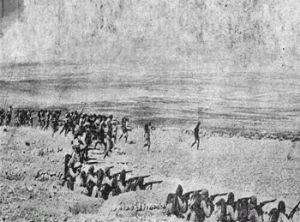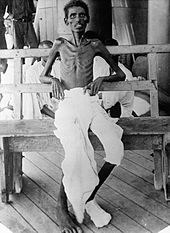After their defeat at Ctesiphon, on November 22, 1915, General Tonwshend’s troops (consisting principally of the 6th Poona Division) were driven back to the town of Kut el-Amara, where they had established a fortified base. Here, encircled by the Turkish forces they were besieged from early December to the end of April 1916.
Towards the end of that period Kalyan wrote this letter:

Kut-el-Amara
16/4/16
Ma, It’s been almost 5 months since I sat down to write to you. I’ve often thought of writing in these months but since nothing was known about when we would be able to send letters, I never got around to it. Since yesterday people here have come to accept that we will not be relieved. The troops have been on half-rations for the last month and even those have been steadily cut over the last 15 days, but despite these measures there’s only enough food to last three more days.
After three months with very little to eat the troops are starving. The mortality rate in the hospital has soared. In the last 15 days many have died for lack of food. Of what use is medicine now? There’s nothing to eat. People are coming to the hospital because starvation has made them weak. With nothing to give them, how can we help? Apart from that, there are no medicines left either.
We, meaning the officers, have all lost a lot of weight. Even then, despite eating nothing through the day, none of us have fallen sick. I haven’t suffered that much. Apart from our rations of four ounces of atta and 1 pound of horsemeat, I’ve occasionally bought a little food from the bazar. But I’ve still lost a lot of weight. I won’t talk about our lack of food though, for my health is fine, and I’ve even lost a bit of my paunch.
…
The siege started on Dec 5 and it is now the 26th of April. But it’s some consolation that things will be decided one way or another in the next 3 or 4 days and we will find ourselves either on this shore or that. We’ll probably end up on the other shore. There’s no way we could break out of the enemy’s encirclement and rejoin our own side.
…
Don’t worry at all. Remember – if I am imprisoned I won’t be in the midst of the fighting. I don’t know when or how this letter will get to you. I’m writing it anyway. I’ll send it if an opportunity arises. If they don’t imprison the patients who are in the worst condition – if they send them down to ‘Amara’ – then this letter will go with them. (402)

Three days later Kalyan wrote another letter, in English:
29-4-16
Ma
On account of hunger, our General was obliged to surrender to-day. Turkish flag has been put up and the British flag taken down. Turkish troops entered the town this afternoon.
Now for goodness sake don’t die of fright… please cheer up. I shall let you know afterwards how often you would hear from me and how to send letters to me.
Yours
Kalyan
(403-4)
Soon after the surrender, Kalyan wrote home again.
1-5-16
Ma
I wrote you a letter on April 26th and a postcard on the 29th. Listen to what happened on the 29th. Our commander, General Townshend laid his arms at the feet of Turkey’s Halil Bey and surrendered. Before that, the British flag had been lowered and the Turkish flag had been raised on the fort. The two commanders shook hands. Halil Bey behaved with the greatest courtesy; he returned Townshend’s arms and took him off somewhere with the greatest kindness. What can I tell you Ma of how well Halil Bey treated us? How much fresh food and water he had readied for us! And he let us have it all. After consuming all of that, it is as if our lives had been renewed.
Halil Bey’s orders to us were: ‘Enjoy yourselves for three days – eat as much as you want and write as many letters as you like. After three days you will have to move elsewhere – and then you will be allowed to write only one letter a week, of four lines.’
[In Kut] We had consumed our rations in a couple of months. Towards the end even our water had run dry. In the fort’s courtyard we dug 40 wells and found some water. It was bad, muddy water. At the end, all our mules were slaughtered and one pound of meat was distributed to us. Many died for lack of food.
…
I and my friend Puri are fine. We are quite fit as well. At times the water situation was difficult, but we used filters before drinking it. What we went through during the siege is beyond description. When we came here, after our defeat at Ctesiphon, our numbers were 10/11 thousand; now it is less than half that. It’s horrifying! Even now we have hundreds of patients, many will not survive. So much water from the Tigris has entered the fort that everything has turned to mud.
…
You mustn’t do yourself harm by worrying about me. I want to see you when I get home. I’m perfectly all right. I have to write four other long letters. I’ll take your leave for now.
Yours
Kalyan.
(405-7)
(the page references are to Kalyan Pradeep: Captain Kalyan Kumar Mukhopadhaya, I.M.S.-er Jiboni, by Mokkhoda Debi (Kolkata, 1928) [‘Kalyan Pradeep: The Life of Captain Kalyan Kumar Mukherji, I.M.S.’] The translations are mine).

i find it fascinating that what happened to Anzac soldiers in Gallipoli in 1915 is still mourned to this day, but the fate of all these Indian soldiers is just in some books, already forgotten. amazing how politicized the history is.